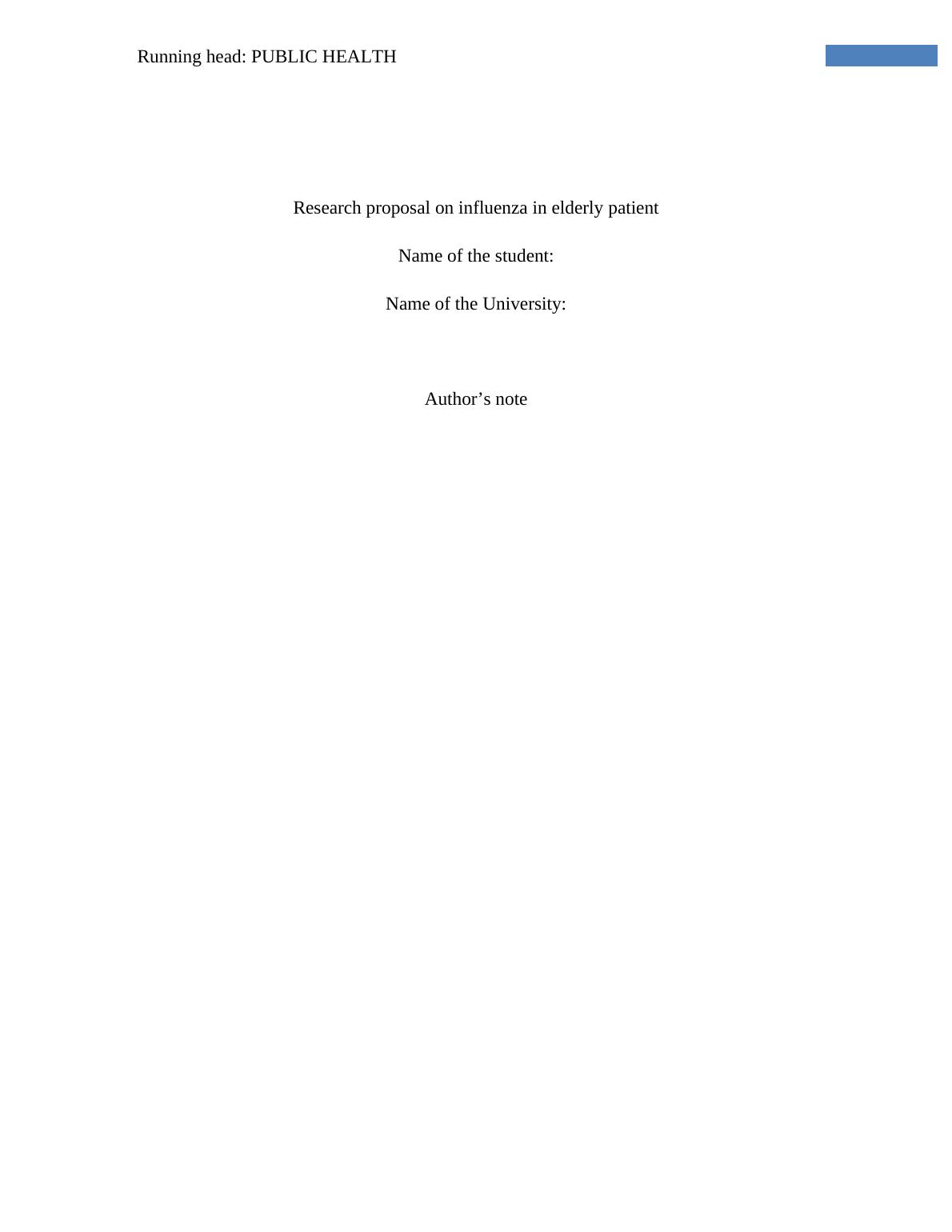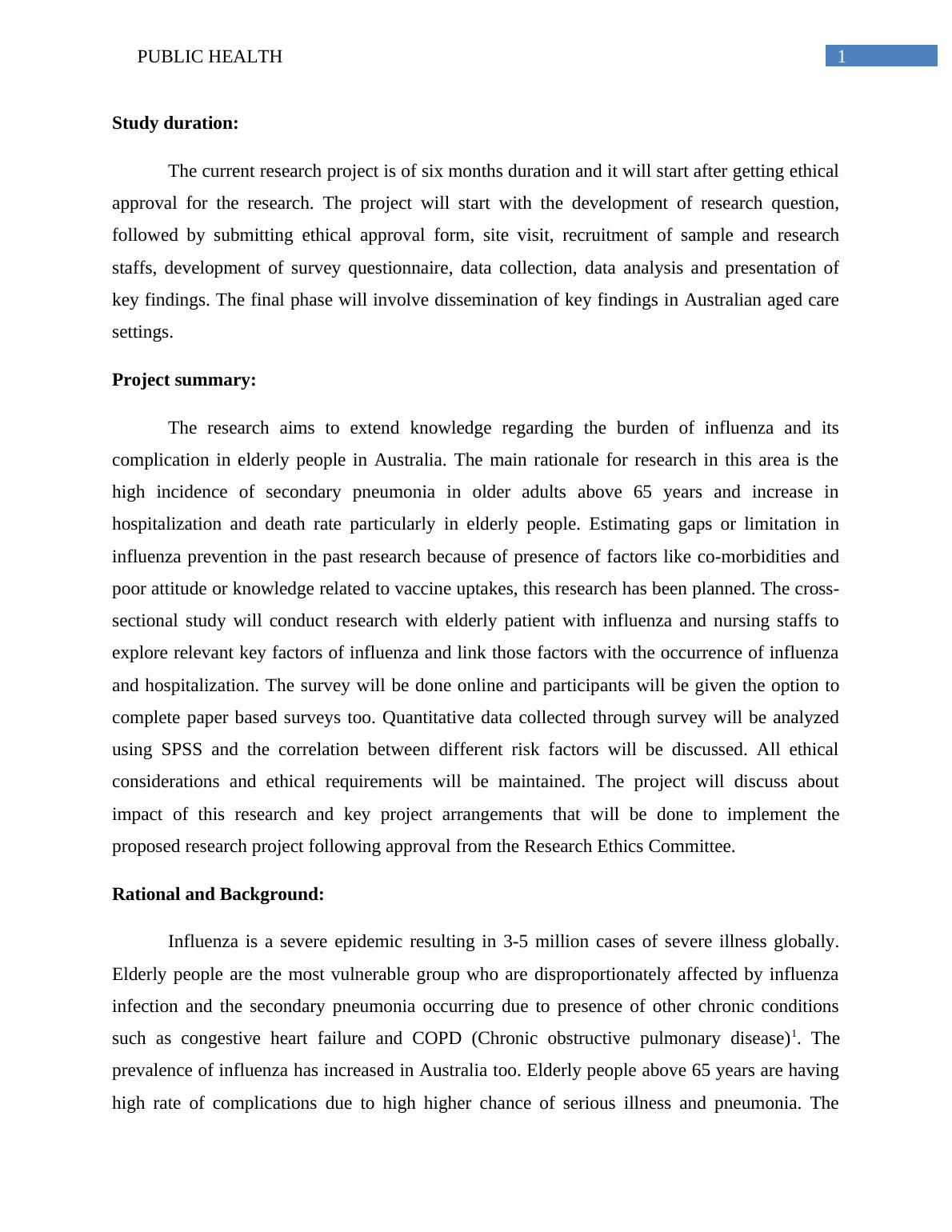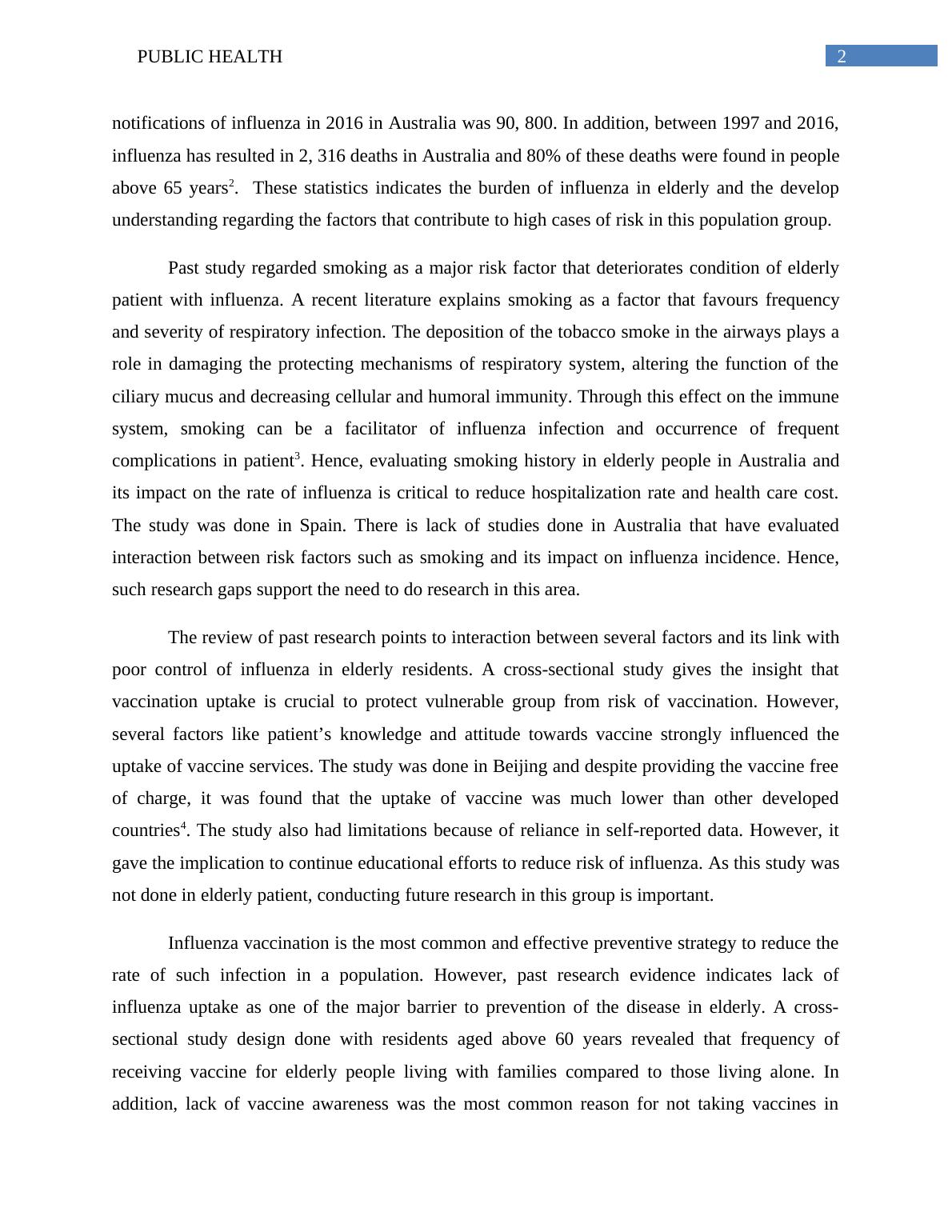Research Proposal on Influenza in Elderly Patient 2022
Added on 2022-10-15
10 Pages3446 Words16 Views
Running head: PUBLIC HEALTH
Research proposal on influenza in elderly patient
Name of the student:
Name of the University:
Author’s note
Research proposal on influenza in elderly patient
Name of the student:
Name of the University:
Author’s note

1PUBLIC HEALTH
Study duration:
The current research project is of six months duration and it will start after getting ethical
approval for the research. The project will start with the development of research question,
followed by submitting ethical approval form, site visit, recruitment of sample and research
staffs, development of survey questionnaire, data collection, data analysis and presentation of
key findings. The final phase will involve dissemination of key findings in Australian aged care
settings.
Project summary:
The research aims to extend knowledge regarding the burden of influenza and its
complication in elderly people in Australia. The main rationale for research in this area is the
high incidence of secondary pneumonia in older adults above 65 years and increase in
hospitalization and death rate particularly in elderly people. Estimating gaps or limitation in
influenza prevention in the past research because of presence of factors like co-morbidities and
poor attitude or knowledge related to vaccine uptakes, this research has been planned. The cross-
sectional study will conduct research with elderly patient with influenza and nursing staffs to
explore relevant key factors of influenza and link those factors with the occurrence of influenza
and hospitalization. The survey will be done online and participants will be given the option to
complete paper based surveys too. Quantitative data collected through survey will be analyzed
using SPSS and the correlation between different risk factors will be discussed. All ethical
considerations and ethical requirements will be maintained. The project will discuss about
impact of this research and key project arrangements that will be done to implement the
proposed research project following approval from the Research Ethics Committee.
Rational and Background:
Influenza is a severe epidemic resulting in 3-5 million cases of severe illness globally.
Elderly people are the most vulnerable group who are disproportionately affected by influenza
infection and the secondary pneumonia occurring due to presence of other chronic conditions
such as congestive heart failure and COPD (Chronic obstructive pulmonary disease)1. The
prevalence of influenza has increased in Australia too. Elderly people above 65 years are having
high rate of complications due to high higher chance of serious illness and pneumonia. The
Study duration:
The current research project is of six months duration and it will start after getting ethical
approval for the research. The project will start with the development of research question,
followed by submitting ethical approval form, site visit, recruitment of sample and research
staffs, development of survey questionnaire, data collection, data analysis and presentation of
key findings. The final phase will involve dissemination of key findings in Australian aged care
settings.
Project summary:
The research aims to extend knowledge regarding the burden of influenza and its
complication in elderly people in Australia. The main rationale for research in this area is the
high incidence of secondary pneumonia in older adults above 65 years and increase in
hospitalization and death rate particularly in elderly people. Estimating gaps or limitation in
influenza prevention in the past research because of presence of factors like co-morbidities and
poor attitude or knowledge related to vaccine uptakes, this research has been planned. The cross-
sectional study will conduct research with elderly patient with influenza and nursing staffs to
explore relevant key factors of influenza and link those factors with the occurrence of influenza
and hospitalization. The survey will be done online and participants will be given the option to
complete paper based surveys too. Quantitative data collected through survey will be analyzed
using SPSS and the correlation between different risk factors will be discussed. All ethical
considerations and ethical requirements will be maintained. The project will discuss about
impact of this research and key project arrangements that will be done to implement the
proposed research project following approval from the Research Ethics Committee.
Rational and Background:
Influenza is a severe epidemic resulting in 3-5 million cases of severe illness globally.
Elderly people are the most vulnerable group who are disproportionately affected by influenza
infection and the secondary pneumonia occurring due to presence of other chronic conditions
such as congestive heart failure and COPD (Chronic obstructive pulmonary disease)1. The
prevalence of influenza has increased in Australia too. Elderly people above 65 years are having
high rate of complications due to high higher chance of serious illness and pneumonia. The

2PUBLIC HEALTH
notifications of influenza in 2016 in Australia was 90, 800. In addition, between 1997 and 2016,
influenza has resulted in 2, 316 deaths in Australia and 80% of these deaths were found in people
above 65 years2. These statistics indicates the burden of influenza in elderly and the develop
understanding regarding the factors that contribute to high cases of risk in this population group.
Past study regarded smoking as a major risk factor that deteriorates condition of elderly
patient with influenza. A recent literature explains smoking as a factor that favours frequency
and severity of respiratory infection. The deposition of the tobacco smoke in the airways plays a
role in damaging the protecting mechanisms of respiratory system, altering the function of the
ciliary mucus and decreasing cellular and humoral immunity. Through this effect on the immune
system, smoking can be a facilitator of influenza infection and occurrence of frequent
complications in patient3. Hence, evaluating smoking history in elderly people in Australia and
its impact on the rate of influenza is critical to reduce hospitalization rate and health care cost.
The study was done in Spain. There is lack of studies done in Australia that have evaluated
interaction between risk factors such as smoking and its impact on influenza incidence. Hence,
such research gaps support the need to do research in this area.
The review of past research points to interaction between several factors and its link with
poor control of influenza in elderly residents. A cross-sectional study gives the insight that
vaccination uptake is crucial to protect vulnerable group from risk of vaccination. However,
several factors like patient’s knowledge and attitude towards vaccine strongly influenced the
uptake of vaccine services. The study was done in Beijing and despite providing the vaccine free
of charge, it was found that the uptake of vaccine was much lower than other developed
countries4. The study also had limitations because of reliance in self-reported data. However, it
gave the implication to continue educational efforts to reduce risk of influenza. As this study was
not done in elderly patient, conducting future research in this group is important.
Influenza vaccination is the most common and effective preventive strategy to reduce the
rate of such infection in a population. However, past research evidence indicates lack of
influenza uptake as one of the major barrier to prevention of the disease in elderly. A cross-
sectional study design done with residents aged above 60 years revealed that frequency of
receiving vaccine for elderly people living with families compared to those living alone. In
addition, lack of vaccine awareness was the most common reason for not taking vaccines in
notifications of influenza in 2016 in Australia was 90, 800. In addition, between 1997 and 2016,
influenza has resulted in 2, 316 deaths in Australia and 80% of these deaths were found in people
above 65 years2. These statistics indicates the burden of influenza in elderly and the develop
understanding regarding the factors that contribute to high cases of risk in this population group.
Past study regarded smoking as a major risk factor that deteriorates condition of elderly
patient with influenza. A recent literature explains smoking as a factor that favours frequency
and severity of respiratory infection. The deposition of the tobacco smoke in the airways plays a
role in damaging the protecting mechanisms of respiratory system, altering the function of the
ciliary mucus and decreasing cellular and humoral immunity. Through this effect on the immune
system, smoking can be a facilitator of influenza infection and occurrence of frequent
complications in patient3. Hence, evaluating smoking history in elderly people in Australia and
its impact on the rate of influenza is critical to reduce hospitalization rate and health care cost.
The study was done in Spain. There is lack of studies done in Australia that have evaluated
interaction between risk factors such as smoking and its impact on influenza incidence. Hence,
such research gaps support the need to do research in this area.
The review of past research points to interaction between several factors and its link with
poor control of influenza in elderly residents. A cross-sectional study gives the insight that
vaccination uptake is crucial to protect vulnerable group from risk of vaccination. However,
several factors like patient’s knowledge and attitude towards vaccine strongly influenced the
uptake of vaccine services. The study was done in Beijing and despite providing the vaccine free
of charge, it was found that the uptake of vaccine was much lower than other developed
countries4. The study also had limitations because of reliance in self-reported data. However, it
gave the implication to continue educational efforts to reduce risk of influenza. As this study was
not done in elderly patient, conducting future research in this group is important.
Influenza vaccination is the most common and effective preventive strategy to reduce the
rate of such infection in a population. However, past research evidence indicates lack of
influenza uptake as one of the major barrier to prevention of the disease in elderly. A cross-
sectional study design done with residents aged above 60 years revealed that frequency of
receiving vaccine for elderly people living with families compared to those living alone. In
addition, lack of vaccine awareness was the most common reason for not taking vaccines in

End of preview
Want to access all the pages? Upload your documents or become a member.
Related Documents
Influenza Infection: A Public Health Concern and Strategieslg...
|12
|3081
|98
EFFECTIVE NURSING CARE PRACTICES CASE STUDY 2022lg...
|10
|2927
|30
Evaluation of Annual Influenza Vaccination for Older Adults and Community Nurseslg...
|10
|2934
|151
Practice Recommendation 1 Pneumococcal vaccines as a preventive measure for dealing with pneumonia in older adultslg...
|6
|931
|484
Cryptogenic Organizing Pneumonialg...
|4
|598
|282
Public Health Initiative | Report Studylg...
|19
|4778
|22